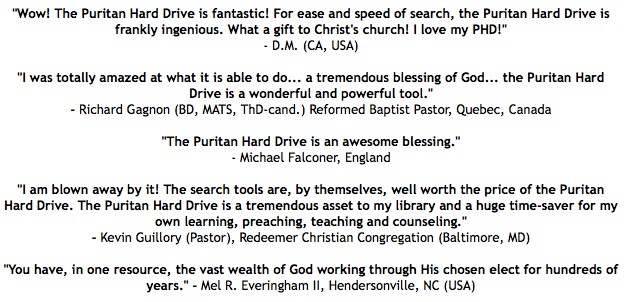 Loading... Please wait...
Loading... Please wait...- SWRB Home
-
Free Resources
- Short Listings Of Free Reformation & Creation Resources
- Free Reformed, Puritan, Covenanter and Creationist Videos
- Thousands of Links to Free Audio, Video and Printed Resources
- Free Puritan Books, Reformed MP3s, and Calvinist Videos
- Puritan Quotes, Free Reformation MP3s, Reformed Books and Calvinist Videos From PuritanDownloads.com On FaceBook
- Shipping & Returns
- Blog
- Privacy Policy
- Contact Us
- Payment Options
- Help
-
About Us
- Sitemap
Pastor Scott Brown, on the left in the video above, is the Director of the National Center for Family-Integrated Churches (NCFIC)
Resource Categories
- PURITAN HARD DRIVE REVIEWS
- PASTOR ROB VENTURA ON THE PURITAN HARD DRIVE
- DR. VODDIE BAUCHAM, JR. ON THE PURITAN HARD DRIVE
- R. C. SPROUL ON SWRB
- DR. JOEL R. BEEKE ON THE PURITAN HARD DRIVE
- PASTOR GREG L. PRICE ON THE PURITAN HARD DRIVE
- DR. MATTHEW MCMAHON ON THE PURITAN HARD DRIVE
- PASTOR SCOTT BROWN ON THE PURITAN HARD DRIVE
- PASTOR W. J. MENCAROW ON THE PURITAN HARD DRIVE
- JOAQUIN FERNANDEZ ON THE PURITAN HARD DRIVE
- PASTOR DAVID SILVERSIDES ON THE PURITAN HARD DRIVE
- JOHN HENDRYX ON THE PURITAN HARD DRIVE
- PASTOR KEVIN GUILLORY ON THE PURITAN HARD DRIVE
- RICHARD BENNETT ON THE PURITAN HARD DRIVE
- DR. KENNY RHODES ON THE PURITAN HARD DRIVE
- JUSTIN RAWSON ON THE PURITAN HARD DRIVE
- PASTOR JAMES WALLACE ON THE PURITAN HARD DRIVE
- PASTOR RICHARD GAGNON ON THE PURITAN HARD DRIVE
- PASTOR JOE HAYNES ON THE PURITAN HARD DRIVE
- DR. STEVEN DILDAY ON THE PURITAN HARD DRIVE
- PASTOR ANDREW COMPTON ON THE PURITAN HARD DRIVE
- TERENCE ELLARD ON THE PURITAN HARD DRIVE
- PASTOR JERRY JOHNSON ON THE PURITAN HARD DRIVE
- PASTOR DAVID PETRIE ON THE PURITAN HARD DRIVE
- JIM DODSON ON THE PURITAN HARD DRIVE
- PASTOR BRIAN SCHWERTLEY ON THE PURITAN HARD DRIVE
- PASTOR PHIL GIBSON ON THE PURITAN HARD DRIVE
- MEL R. EVERINGHAM II ON THE PURITAN HARD DRIVE
- PAUL BLYTH ON THE PURITAN HARD DRIVE
- STEVE KETTLER ON THE PURITAN HARD DRIVE
- D. M. (CALIFORNIA) ON THE PURITAN HARD DRIVE
- MICHAEL CAUGHRAN ON THE PURITAN HARD DRIVE
- WIILIAM NOPPER IV ON THE PURITAN HARD DRIVE
- LINDA THERIAULT ON THE PURITAN HARD DRIVE
- WILLIAM WARNOCK ON THE PURITAN HARD DRIVE
- ROBERT KOH ON THE PURITAN HARD DRIVE
- WHAT'S ON THE PURITAN HARD DRIVE?
- ALL PURITAN HARD DRIVE VIDEOS
- PHD-ODE INSTALLATION VIDEOS
- COMMENTS ON SWRB
- ALL PURITAN QUOTE VIDEOS
- PURITAN HARD DRIVE SCREENSHOTS
- PURITAN HARD DRIVE MINISTRY AND DONATION OFFERS
- TABLE OF RESOURCE CATEGORIES
- Advanced Studies
- SWRB SERMONAUDIO MOBILE APP
- Apologetics
- Assurance
- Attributes and Holiness of God
- Augustine
- Banner of Truth
- Baptism
- Beginners
- Bibles (Geneva, KJV, Hexapla, etc.)
- Biblical Counseling
- BIBLICAL HD COLLECTION
- Biblical Interpretation (Hermeneutics)
- Biographies and Autobiographies
- Calvinism and the Sovereignty of God
- CALVINISM HD COLLECTION
- CALVINIST CLASSICS HD COLLECTION
- Charles Spurgeon
- Children's Books
- CHRISTIAN EDUCATION HD COLLECTION
- Christian History
- Church Government
- Civil Government and Resistance
- CLASSIC CHRISTIAN HD COLLECTION
- Classic Puritan and Reformed Sets
- Commentaries
- Contemporary Issues
- Covenant Theology and Covenanting
- COVENANTER HD COLLECTION
- Covenanters and Covenanted Reformation
- Creation and Creationism
- Creeds, Confessions and Covenants
- Cults, False Religions, Psychology, Humanism
- Dealing with Affliction, Suffering, and Sickness
- Debates
- Dutch Reformed
- Education and Home Schooling
- English Puritans, Covenanters and Reformers
- Family, Children, Home, and Family Worship
- First Reformation
- Five Points of Calvinism (TULIP)
- For Pastors and Elders
- For Seminary Students
- FREE PURITAN & REFORMATION MP3 AUDIO SERMONS/BOOKS
- FREE PURITAN BOOKS, REFORMATION MP3s, PDFs, VIDEOs
- George Gillespie
- God's Law, The Ten Commandments, etc.
- Greg L. Price on Headcoverings
- Heaven, Hell and the Final Judgment
- Holy Days (Lord's Day, Christmas, Easter, etc.)
- HOME SCHOOL HD COLLECTION
- Intermediate Studies
- John Bunyan
- John Calvin
- John Knox
- John Owen
- Jonathan Edwards
- Justification
- Languages, Dictionaries, Reference, etc.
- LOOK WHO LOVES THE PURITAN HARD DRIVE
- Lord's Supper (Communion)
- Marriage, Courtship, etc.
- Martin Luther and Lutheranism
- Martyrs and Persecution
- Other Protestant Works
- Predestination and Providence
- PRESBYTERIAN HD COLLECTION
- Presbyterians and Presbyterianism
- Prophecy, Antichrist, and Eschatology
- PROTESTANT HD COLLECTION
- PSALM SINGING MP3s (COMPLETE SET)
- Psalters, Psalm Singing and Music
- Puritan Facts
- PURITAN FAST SERMONS (1640-1653) - 34 VOLS SET
- Puritan Fast Sermons 1640-1653
- Puritans and Puritanism
- PURITAN HARD DRIVE
- REFORMATION HD COLLECTION
- Reformation History
- Reformed and Puritan Classics
- Reformed Baptist
- REFORMED BAPTIST HD COLLECTION
- REFORMED HD COLLECTION
- REFORMED PRESBYTERIAN HD COLLECTION
- Reformed Presbytery, RPNA Protesters, etc.
- Reformed Theology
- Reformed Worship, The Regulative Principle, etc.
- Roman Catholicism, the Jesuits, Islam, etc.
- Salvation and Evangelism
- Samuel Rutherford
- Sanctification, Prayer and Holiness
- Scottish Covenanters
- Scottish Presbyterianism
- Scripture Song MP3s (Psalms and Bibles Verses)
- Second Reformation
- Separation, Unity, Uniformity, etc.
- Sermons and Sermon Collections
- Solemn League and Covenant
- Theology and Doctrine
- Third Reformation
- Thomas Watson
- Westminster Confession, Assembly and Divines
- Authors (All A to Z)
Phone Orders:
(780) 450-3730
To obtain free Reformation books, Puritan MP3s and Calvinistic videos, SWRB discount coupons, etc., add yourself to SWRB's Puritan and Reformed email list by using the form above.
The Decades of Henry Bullinger (4 Volume Set) Fifty Sermons Divided Into Five Decades Containing the Chief and Principle Points of Christian Religion (1849-1852 edition)
Resource Details
Resource Description
"Henry Bullinger (1504-1575) was one of the most widely esteemed leaders of the Reformed churches, and The Decades was the most famous of his 150 treatises and manuscripts. The Decades derives its name from being a series of fifty theological sermons divided into five groups of ten sermons each. Each sermon is a helpful, detailed exposition of an important doctrine. Combined, they encompass the field of theology in a form readable for the typical layman. They became more popular than Calvin's Institutes in England."
"From 1550 to 1560, there were in England 77 editions of Bullinger's Latin "Decades" and 137 editions of their vernacular translation "House Book", a treatise in pastoral theology (in comparison, Calvin's Institutes had two editions in England during the same time). Some historians count Bullinger together with Bucer as the most influential theologian of the Anglican reformation…. Bullinger played a crucial role in the drafting of the Second Helvetic Confession of 1566. What eventually became the Second Helvetic Confession originated in a personal statement of his faith which Bullinger intended to be presented to the Zurich Rat upon his death. In 1566, when the elector palatine introduced Reformed elements into the church in his region, Bullinger felt that this statement might be useful for the elector, so he had it circulated among the Protestant cities of Switzerland who signed to indicate their assent. Later, the Reformed churches of France, Scotland, and Hungary would do likewise…. Bullingers works comprise 127 titles. Already during his lifetime they were translated in several languages and counted among the best known theological works in Europe…. His main work was the Decades, "a treatise in pastoral theology, in the vernacular called "House Book"." (http://en.wikipedia.org/wiki/Heinrich_Bullinger).
"This reprinting of Bullinger's The Decades makes available a seminal survey of Christian teaching by one of the most significant of the second generation Reformers. Both in their content and in their homiletical tone, The Decades offered the mid-sixteenth century a basic text from which Christian readers could learn both the content of the faith and the life of Christian obedience. Their importance is evidenced in the numerous printings both in Latin and in the vernacular that mark out the influence of The Decades among English, Dutch, and German-speaking Protestants. May this reprint enhance contemporary recognition of Bullinger's contribution to the Reformation."
- Richard A. Muller
Calvin Theological Seminary, Grand Rapids, Michigan
"Presented in theological form 'The Decades' contain fifty sermons that expound some of the most important doctrinal themes of the Reformation; certainly, Bullinger's most comprehensive and complete theological work. It holds firm to the conviction that the covenant unity of history is a manifestation of God's Providential action in time. This work towers in scope and depth. The Decades are the result of years of dedicated research. They contain extensive scripture citations and quotations from early church fathers, such as Augustine and Tertullian.
For Bullinger, the Church did not start at the dawn of Pentecost or birth of Christ (as taught by proponents of dispensationalism) but has been in existence since the promise made in Genesis 3:15. Such is the nature and essence of all true covenant theology.
The Decades are the historical embodiment of Reformed theology. So effective and articulate was their theological influence that Archbishop Whitgift in 1568 "obtained an order in convocation that every clergyman should procure a copy of [The Decades] and read one [sermon] once a week". At one time these volumes (originally published in five) where required reading for all clergy.
In his essay, Heinrich Bullinger as Theologian, Edward Dowey comments, "Bullinger's Decades, a major reformation classic, is unchallengeable his most full bodied and comprehensive theological work, containing the richness of his scholarship, gathering together themes of all his major writings up to that time, and exhibiting the churchly purpose of being a theological source book for pastors to aid them in the preparation of sermons."
Nicolas Elliot (Englishman of law and pupil of Bullinger) has said regarding Bullinger's work, "Your books are well received, not only by our king, but equally so by the lord Cromwell, who is keeper of the king's privy seal and vicar of the church of England… May God, therefore, give you the disposition to publish all your writings as speedily as possible, whereby you will not only fill the coffers, of the booksellers, but will gain over very many souls to Christ, and adorn his church with most precious jewels."
Bullinger survived the plague of 1564 and 1565, but lost his wife and three children (events certain to cause sorrow in the strongest of hearts). However, Bullinger's resolve in Providence was firm: "We content ourselves in the only word of God; and do therefore simply believe and teach, that God by his providence doth govern all things." He was a true scholar and pastor of the Reformation; sought out by Calvin, on more than one occasion, for his comfort, counsel and friendship. Calvin called Bullinger an "illustrious… and highly to be revered brother in the Lord". Hence, he was not just a theologian, but also a man of firm character and godly reputation.
It is a great and mysterious question as to why Bullinger's writings fell into obscurity, why his works have been neglected; not receiving the wide recognition, as did Calvin's. Bullinger was born 5 years before Calvin and lived 11 years after Calvin. Calvin's correspondence consists of roughly 4,300 letters while Bullinger produced some 12,000 letters. His collected works comprise over 119 volumes, of which, The Decades represent the best that those volumes have to offer.
Comparable to 'Calvin's Institutes' in magnitude and comprehensiveness (at one time even outselling them) these volumes are bound to bring theological pleasure to readers for years to come.
So, should you buy Bullinger's Decades? Yes, buy them. For in buying The Decades, it is no exaggeration to say that we are buying a valuable piece of the Reformation. Perhaps, we will not agree with all his positions, but neither do we agree with every good theologian line upon line. Overall the sermons are sound, theologically precise and delivered straight from the heart of a man properly labeled 'pastor's pastor'.
As Jean-Marc Berthoud has said, "Much else could usefully be said on this immensely scholarly doctor of the Church, this incomparable pastor, this man of indomitable faith whose mighty works, though today largely forgotten and sadly neglected, still spread, for whoever takes the trouble to consult them, a truly heavenly light." When you posses The Decades I am confident they will speak for themselves."
- Heinrich Bullinger "The Decades" reviewed by B. K. Campbell
Contents of The Decades of Henry Bullinger (Volume 1):
- The Preface (pp. 1-11).
- 2. Of the Four General Synods or Councils (pp. 12-35).
- 3. The First Decade of Sermons (pp. 36-192).
- 1. First Sermon: Of the Word of God; the cause of it; and how, and by whom, it was revealed to the world (36-57).
- 2. Second Sermon: Of the Word of God; to whom, and to what end, it was revealed; also in what manner it is to be heard; and that it doth fully teach the whole doctrine of godliness (57-70).
- 3. Third Sermon: Of the sense and right exposition of the word of God, and by what manner of means it may be expounded (70-80).
- 4. Fourth Sermon: Of true faith; from whence it cometh; that it is an assured belief of the mind, whose only stay is upon God and his Word (81-97).
- 5. Fifth Sermon: That there is one only true faith, and what the virtue thereof is (97-104).
- 6. Sixth Sermon: That the faithful are justified by faith without the law and works (104-121).
- 7. Seventh Sermon: Of the first articles of the Christian faith contained in the Apostles' Creed (122-139).
- 8. Eighth Sermon: Of the latter articles of the Christian faith contained in the Apostles' Creed (140-157).
- 9. Ninth Sermon: Of the latter articles of Christian faith contained in the Apostles' Creed (157-179).
- 10. Tenth Sermon: Of the love of God and Neighbor (180-192) .
- 4. The Second Decade of Sermons (pp. 193-435).
- 1. First Sermon: Of laws, and of the law of nature, then of the laws of men (193-209).
- 2. Second Sermon: Of God's law, and of the two first commandments of the first table (209-237).
- 3. Third Sermon: Of the third precept of the Ten Commandments, and of swearing (237-253).
- 4. Fourth Sermon: Of the fourth precept of the first table, that is, of the order and keeping of the Sabbath-Day (253-267).
- 5. Fifth Sermon: Of the first precept of the second table, which is in order the fifth of the Ten Commandments, touching upon honour due to the parents (267-298).
- 6. Sixth Sermon: Of the second precept of the second table, which is in order the sixth of the Ten Commandments, thou shalt not kill: and of the magistrate (298-322).
- 7. Seventh Sermon: Of the office of the magistrate, whether the care of religion appertain to him or no, and whether he may make laws and ordinances in cases of religions (323-344).
- 8. Eighth Sermon: Of judgment, and the office of the judge; that Christians are not forbidden to judge; of revengement and punishment; whether it be lawful for a magistrate to kill the guilty; wherefore, when, how, and what the magistrate must punish; whether he may punish offenders in religion or no (345-369).
- 9. Ninth Sermon: Of war; whether it be lawful for a magistrate to make war. What the Scripture teacheth touching war. Whether a Christian man may bear the office of a magistrate. And of the duty of subjects (370-393).
- 10. Tenth Sermon: Of the third precept of the second table, which is in order the seventh of the Ten Commandments; thou shalt not commit adultery of wedlock; against all intemperance; of continency (393-435).
Contents of The Decades of Henry Bullinger (Volume 2):
- 1. Dedication to Prince Edward VI, King of England and France (pp. 3-16).
- 2. The Third Decade of Sermons (pp. 17-432).
- 1. First Sermon: Of the fourth precept of the second table, which is in order the eighth of the Ten Commandments, thou shalt not steal. Of the owning and possessing of proper goods, and of the right and lawful getting of the same; against sundry kinds of theft (17-48).
- 2. Second Sermon: Of the lawful use of earthly goods; that is, how we may rightly possess, and lawfully spend, the wealth that is rightly and justly gotten; of restitution, and alms-deeds (48-64).
- 3. Third Sermon: Of the patient bearing and abiding of sundry calamities and miseries; and also of the hope and manifold consolation of the faithful (64-111).
- 4. Fourth Sermon: Of the fifth and sixth precepts of the second table, which are in order the ninth and tenth of the Ten Commandments, that is, thou shalt not speak false witness against they neighbor; and, though shalt not covet they neighbor's house, etc. (111-124).
- 5. Fifth Sermon: Of the ceremonial law of God, but specifically of the priesthood, time, and place appointed for the ceremonies (125-167).
- 6. Sixth Sermon: Of the sacraments of the Jews; of their sundry sorts of sacrifices, and certain other things pertaining to the ceremonial law (167-217).
- 7. Seventh Sermon: Of the judicial laws of God (217-236).
- 8. Eighth Sermon: Of the use or effect of the law of God, and of the fulfilling and abrogating of the same; of the likeness and difference of both the testaments and people, the Old and the New (236-300).
- 9. Ninth Sermon: Of Christian liberty, and of offences. Of good works, and the reward thereof (300-357).
- 10. Tenth Sermon: Of sin, and of the kinds thereof; to wit, of original and actual sin, and of sin against the Holy Ghost; and lastly, of the most sure and just punishment of sins (358-432).
Contents of The Decades of Henry Bullinger (Volume 3):
- 1. The Fourth Decade of Sermons (pp. 1-114).
- 1. First Sermon: Of the Gospel of the grace of God, who hath given his Son unto the world, and in Him all things necessary to salvation, that we, believing in Him, might obtain eternal life (1-55).
- 2. Second Sermon: Of repentance, and the causes therefore; of confession, and remission of sins; of satisfaction and indulgences; of the old and new man; of the power or strength of men, and the order of things pertaining to repentance (55-114) .
- 2. Dedication to Edward VI, King of England and France (pp. 115-122).
- 3. The Fourth Decade of Sermons CONTINUED (pp. 123-408).
- 1. Third Sermon: Of God; of the true knowledge of God, and of the diverse ways how to know him; that God is one in substance and three in persons (123-173).
- 2. Fourth Sermon: That God is the creator of all things, and governeth all things by his providence; where mention is also made of the goodwill of God to usward, and of predestination (173-194).
- 3. Fifth Sermon: Of adoring or worshipping, of invocating or calling upon, and of serving the only, living, true, and everlasting God; also of true and false religion (194-238).
- 4. Sixth Sermon: That the Son of God is unspeakably begotten of the Father; that He is consubstantial with the Father, and therefore true God. That the selfsame Son is true man; consubstantial with us; and therefore true God and Man, abiding in two unconfounded natures, and in one undivided Person (238-273).
- 5. Seventh Sermon: Of Christ, King and Priest; of His only and everlasting kingdom and priesthood; and of the name of a Christian (273-297).
- 6. Eighth Sermon: Of the Holy Ghost, the third person in the Trinity to be worshipped, and of His divine power (297-326).
- 7. Ninth Sermon: Of good and evil spirits; that is, of the holy angels of God, and of devils or evil spirits; and of their operations (327-365).
- 8. Tenth Sermon: Of the reasonable soul of man; and of his most certain salvation after the death of the his body (365-408)
Contents of The Decades of Henry Bullinger (Volume 4):
- 1. Biographical Notice of Henry Bullinger (pp. vii-xxxi).
- 2. The Fifth Decade of Sermons (pp. 3-526).
- 1. First Sermon: Of the holy catholic church; what it is, how far it extendeth, by what marks it is known, from whence it springeth, how it is maintained and preserved, whether it may err. Also of the power and studies of the church (3-48).
- 2. Second Sermon: That there is one catholic church; that without the church there is no light or salvation. Against schismatics. Wherefore we depart from the upstart church of Rome. That the church of God is the house, vineyard, and kingdom of God; and the body, sheepfold, and spouse of Christ; a mother and a virgin (49-92).
- 3. Third Sermon: Of the ministry, and the ministries of God's word; wherefore and for what end they are instituted of God. That the orders given by Christ unto the church in times past were equal. Whence and how the prerogative of ministries sprang, and of the supremacy of the bishop of Rome (93-127).
- 4. Fourth Sermon: Of calling unto the ministry of the Word of God. What manner of men, and after what fashion, ministers of the Word must be ordained in the church. Of the keys of the church. What the office of them is that be ordained. Of the manner of teaching the church; and of the holy life of the pastors (128-163).
- 5. Fifth Sermon: Of the form and manner how to pray to God; that is, of the calling on the name of the Lord; where also the Lord's Prayer is expounded; and also singing, thanksgiving, and the force of prayer is entreated (163-226).
- 6. Sixth Sermon: Of signs, and the manner of signs; of sacramental signs: what a sacrament is; of whom, for what causes, and how many sacraments were instituted of Christ for the Christian church; of what things they do consist; how these are consecrated; how the sign and the thing signified in the sacraments are either joined together or distinguished; and of the kind of speeches used in the sacraments (226-292).
- 7. Seventh Sermon: That we must reason reverently of sacraments; that they do not give grace, neither have grace included in them. Again, what the virtue and lawful end and use of the sacraments is. That they profit not without faith; that they are not superfluous to the faithful; and that they do not depend upon the worthiness or unworthiness of the minister (293-351).
- 8. Eighth Sermon: Of holy baptism; what it is; by whom, and when it was instituted, and that there is but one baptism of water. Of the baptism of fire. Of the rite or ceremony of baptism; how, of whom, and to whom it must be administered. Of baptism by midwives; and of infants dying without baptism. Of the baptism of infants. Against Anabaptism or re-baptizing; and of the power of efficacy of baptism (351-401).
- 9. Ninth Sermon: Of the Lord's holy supper; what it is, by whom, when, and for whom it was instituted; after what sort, when, and how oft it is to be celebrated, and of the ends thereof. Of the true meaning of the words of the super, "This is my body." Of the presence of Christ in the supper. Of the true eating of Christ's body. Of the worthy and unworthy eaters thereof: and how every man ought to prepare himself unto the Lord's supper (401-478).
- 10. Tenth Sermon: Of certain institutions of the church of God. Of schools. Of ecclesiastical goods, and the use and abuse of the same. Of churches and holy instruments of Christians. Of the admonition and correction of the ministers of the church, and of the whole church. Of matrimony. Of widows. Of virgins. Of monks. What the church of Christ determineth concerning the sick; and of funerals and burials (478-526) .
- 3. Appendix I: Dedication to the Marquis of Dorset (pp. 528-545).
- 4. Appendix II: Dedication to Masters Gualter, Simler, etc. (pp. 546-558).
- 5. Index of Subjects and Persons (pp. 559-586).
- 6. Index of Various Writers Quoted and Referred to (pp. 587-590). Errata (pp. 591-592)
All resources for sale on this website, with the exception of Scottish Metrical Psalms MP3s, are available on the Puritan Hard Drive .
VIDEO INTRODUCTION TO THE PURITAN HARD DRIVE


Find Similar Resources by Category
Phone Orders:
(780) 450-3730
To obtain free Reformation books, Puritan MP3s and Calvinistic videos, SWRB discount coupons, etc., add yourself to SWRB's Puritan and Reformed email list by using the form above.








































